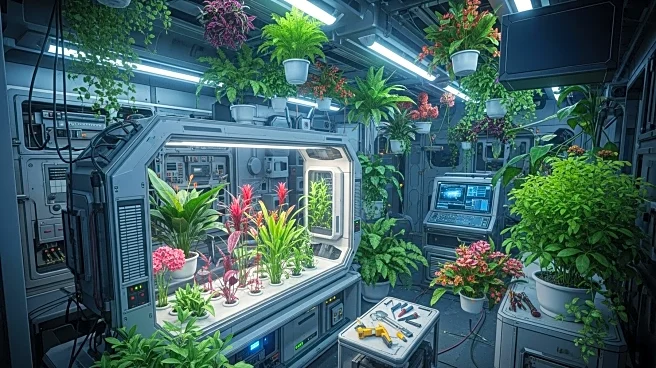What's Happening?
NASA is engaging citizen scientists through its Open Science Data Repository Analysis Working Groups (OSDR-AWG) to tackle nutritional challenges faced by astronauts on missions to the Moon and Mars. These volunteers are analyzing biomedical data from NASA missions and space experiments to understand the health impacts of space-grown food. A recent study focused on lettuce grown on the International Space Station and Tiangong II, revealing significant nutrient deficiencies compared to Earth-grown lettuce. The space-grown lettuce contained 29-31% less calcium and 25% less magnesium, which are crucial for astronaut health. The study also identified two major health challenges: disrupted calcium signaling, which could accelerate bone loss, and leaky gut syndrome, affecting nutrient absorption due to compromised intestinal barriers.
Why It's Important?
The findings from this research are critical for the future of long-duration space missions, where astronauts rely heavily on space-grown food. Nutritional deficiencies can lead to serious health issues, impacting mission success and astronaut well-being. Addressing these challenges is essential for sustainable human presence in space. The proposed solution of bioengineering crops to enhance nutrient content could revolutionize space agriculture, ensuring astronauts receive adequate nutrition. This research not only advances space science but also has potential applications in improving food security on Earth through bioengineering techniques.
What's Next?
NASA and its collaborators are exploring the development of bioengineered crops enriched with essential nutrients to counteract the deficiencies observed in space-grown lettuce. This initiative could lead to the cultivation of plants that are better suited for space environments, providing astronauts with more reliable sources of nutrition. The ongoing collaboration with citizen scientists and research institutions will continue to drive innovation in space agriculture, potentially influencing future space missions and Earth-based agricultural practices.
Beyond the Headlines
The research highlights the importance of interdisciplinary collaboration in solving complex challenges in space exploration. It underscores the role of citizen scientists in contributing valuable insights and data analysis, democratizing scientific research. The study also raises ethical considerations regarding genetic modification of crops, which could have broader implications for food production and consumption on Earth. As space exploration advances, these discussions will become increasingly relevant, shaping policies and practices in both space and terrestrial agriculture.










